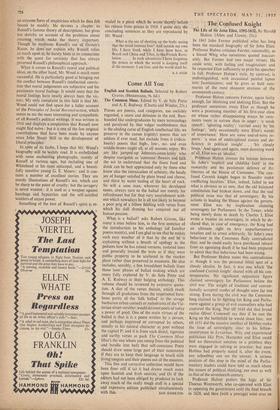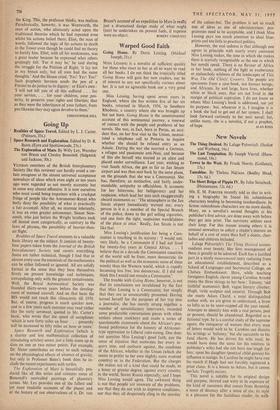The Confused Knight
The Life of Sir John Eliot, 1592-1632. By Harold Hulme. (Allen and Unwin, 35s.) IN 1865 John Forster published what has long been the standard biography of Sir John Eliot. Professor Hulme criticises Forster, reasonably, as a biased Whig who sometimes quoted inaccur- ately. But Forster had two major virtues. He could write, with feeling and imagination; and he respected Eliot sufficiently to print his speeches in full. Professor Hulme's style, by contrast, is undistinguished, with occasional painful lapses into facetiousness; and he gives us bald sum- maries of the most eloquent orations of the seventeenth century.
Professor Hulme censures Forster, again fairly enough, for iddalising and idolising Eliot. But the professor sometimes treats Eliot as though he were a promising member of his first-year class on whose rather disappointing essays he com- ments more in sorrow than in anger : 'a weak speech'; 'ignoring reality'; 'carried away by his feelings'; 'only occasionally were Eliot's words of importance.' Here are sonic end-of-term re- ports : 'a man of undisciplined nature and de- ficiency in political insight' . . . 'his cloudy brain.' And again and again, most damning word of all, Eliot was an 'idealist.'
Professor Hulme stresses the tension between Sir John's 'implicit and childlike faith' in the monarchy and his passionate defence of thz liberties of the House of Commons. 'The con- fused Cornish knight began to flounder midst conflicting loyalties.' Eliot, indeed, failed to see what is obvious to us now, that the old balanced constitution had broken down, and that the real political issue was that of sovereignty. By his actions in leading the House against the govern- ment Eliot was by implication claiming sovereignty for Parliament. In the Tower, while being slowly done to death by Charles I, Eliot wrote a treatise on sovereignty in which he de- clared that, in case of emergency, the King had an ultimate right to levy unparliamentary taxation and to arrest arbitrarily. Sir John's own behaviour in the Commons flatly contradicted that; and he could easily have purchased release from an agonising death if he had been prepared to admit that that behaviour had been wrong.
But Professor Hulme states this contradiction as though it was the personal blind spot of a cloudy idealist. In fact, it was one which 'the confused Cornish knight' shared with all his con- temporaries. No significant opposition figure claimed sovereignty for Parliament before the civil war. The weight of tradition and conven- tionally accepted modes of thought were far too strong. Even during the civil war the Commons long claimed to be fighting for King and Parlia- ment against a group of evil counsellers who had captured the King. Not till 1644 did that brutal realist Oliver Cromwell say that if he met the King on the battlefield he would shoot him : not till 1651 did the massive intellect of Hobbes make the issue of sovereignty clear to his fellow- countrymen in Leviathan. Wily and experienced politicians like Pym, Hampden and Eliot could find no theoretical solution to a problem they were engaged in solving in practice; but once Hobbes had properly stated it, after the event, any schoolboy can see the answer. A serious analysis of this stop in the mind of the Parlia- mentary leaders could have told us much about the nature of political thinking, our own as well as that of the seventeenth century.
Professor Hulme prefers the logic of Sir Thomas Wentworth, who co-operated with Eliot in opposing the government until the final breach in 1628, and then (with a peerage) went over to the King. This, the professor thinks, was realism. Paradoxically, however, it was Wentworth, the man of action, who ultimately acted upon the traditional theories which he had repeated even whilst his actions belied them; Eliot, the man of words, followed the logic of his actions to death in the Tower even though he could find no theory to fortify him. Eliot, with all his weaknesses, was a great leader because he expressed what others gropingly felt. 'For it may be,' he said during the struggle for the Petition of Right, 'it lay not in my breast only, but all men had the same thoughts.' And the House cried, 'Yes! Yes! Yes!' Such prophetic heroism needs the pen of a Forster to do justice to its dignity : or Eliot's own : 'I will not tell you of all this suffered . . . for your service, . . . for your children, your pos- terity, to preserve your rights and liberties; that as they were the inheritance of your fathers, from you likewise they may again devolve to them.'
CHRISTOPHER HILL











































 Previous page
Previous page